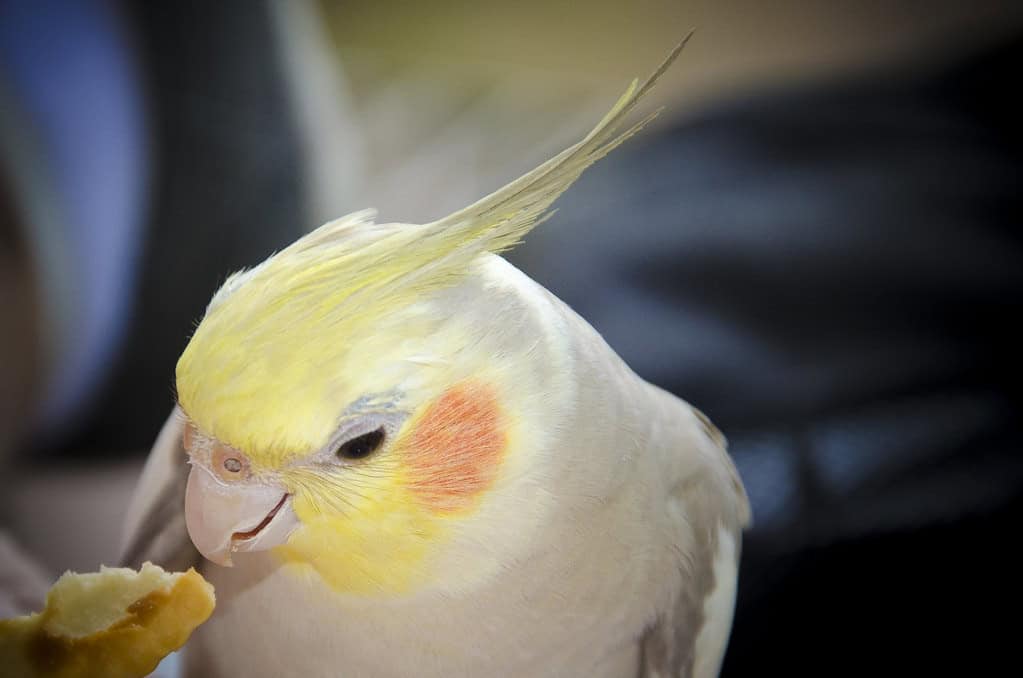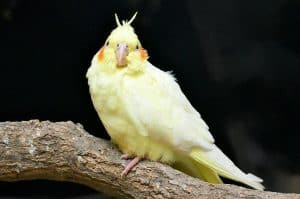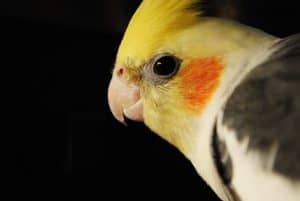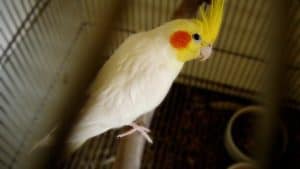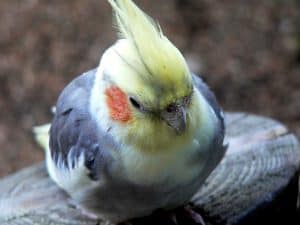Are you considering adding a cockatiel to your family? It’s vital to remember that parrots aren’t the quietest pets. Are cockatiels loud, or are they quieter than other birds? Will you be able to keep them in an apartment for long periods of time? What about their squawking and screeching when they’re upset or lonely?
Let’s look at cockatiel noise levels to see whether these Australian parrots are a good fit for you and your lifestyle. We will also consider how to reduce cockatiel noise for those who already have these birds as pets.
Are cockatiels loud?
It’s all about your personal definition of loudness in the end. Are cockatiels louder than Amazon parrots? In comparison to some of the loudest parrot species, they might as well be quiet. Are they noisier than a goldfish? Yes, compared to goldfish, they are noisy.
- Made in the USA specifically for Lovebirds, Quakers, Small Conures and Cockatiels.
- HEALTHY and DELICIOUS. Fresh, wholesome, natural bird food made with vegetables. Precisely formulated with the essential vitamins, minerals, and amino acids your bird needs every day for a balanced diet.
- ESSENTIAL NUTRITION. Fortified with essential vitamins, minerals, and amino acids. Feed daily to provide the foundation of your birds diet.
- FEED DAILY to provide your bird essential nutrition for a healthy and balanced diet.
- CONVERT YOUR BIRD TO A HEALTHIER DIET. Converting your bird to a food that includes pellets is worth the effort for his/her health and wellbeing. ZuPreem has been dedicated to producing innovative, high-quality products since 1967.
All parrots make a variety of sounds. After all, most species are sociable and may be found in huge flocks in the wild. Cockatiels, like many other bird species, travel in groups of dozens or hundreds of individuals.
And how do you keep in touch with someone who lives three trees away? You communicate. You call out to each other, just like parrots do in the wild.
Cockatiels make a wide range of noises. The sound made when they contact each other, which is rather loud and shrill, is the most bothersome to us humans. In fact, it appears that the majority of ‘tits are capable of generating noises with a decibel level of 80 or more when they call to one another, right on the verge of being damaging to our ears.
It’s important to remember that noise is all relative, though. A human shouting can be 100 decibels or more, which are levels not only extremely loud but also potentially ear-shattering. Put in context, a cockatiel calling out to another individual is pretty tame by comparison.
If you’ve ever had a cockatiel on your shoulder start screaming, you’ll know how loud it can be! The upside is that unless your cockatiel is lonely or unhappy, it should not make too many contact calls.
The great majority of cockatiels make much softer sounds than the shrill contact call. These vocalizations are usually made when a cockatiel is content and may include chirping, whistling, and even singing.
Cockatiels make a fair amount of noise, but most people should be able to tolerate them. They’ll do well in apartments unless you have particularly sensitive neighbors. Cockatiels will do just fine as house pets.
Did you know? A cockatiel is a tiny parrot kind. Cockatiels are not nearly as loud as their larger relatives, which are by far the noisiest pets!
- FAST-ACTING FORMULA: Our cleaner, using its natural enzymes, is incredibly fast-acting and easy to use. Just thoroughly spray the area with bird cage cleaner that has bird poop, let sit 3-5 minutes, use a wet cloth or cleaning brush to loosen and remove the bird poop. Fast-acting and effective stain and odor eliminator pet, no matter the pet's diet.
- POWERFUL NATURAL ENZYMES: Absolutely Clean Amazing Bird Cage Cleaner stain remover uses Powerful, Natural Enzymes to break down the smell and tough debris from bird droppings in your bird cage. Our bird cage accessories does not give off the noxious fumes that youll find with other cleaners making for a more pleasant cleaning experience. Effortlessly remove bird poop off with the cleaning supplies of Absolutely Clean Amazing Bird Poop Remover.
- WORKS GREAT ON UPHOLSTERY: Absolutely Clean Amazing Bird Cage Cleaner is extremely versatile. It is a powerful pet enzyme cleaner to remove the toughest pet stains and pet odor from all of your indoor upholstery and patio furniture as well as your hardscapes. Thoroughly cleaning and refreshing your outdoor living spaces with all purpose cleaner, so you can relax and enjoy, no matter what nature throws your way.
- VETERINARIAN APPROVED: Our vet-approved pet carpet cleaner is made without the use of harsh chemicals or noxious fumes, making for a gentle yet powerful enzyme carpet cleaner for removing the toughest stains and eliminating the most stubborn odors.
- MADE IN THE USA: Absolutely Clean is a small, family owned-and-operated company based in Colorado. We make our pet odor carpet cleaner products at home in the USA. We believe in providing an exceptional cleaning experience for our customers by providing high-quality products. No matter what your cleaning needs are, Absolutely Clean has the pet supplies for you!
Males vs. females
Cockatiels, like other parrot species such as budgies, have significant variations in noise levels between male and female cockatiels. And just as with other parrots, the males are typically the noisiest.
Cockatiels use songs to attract mates and strengthen social connections. They are far more inclined to sing, tweet, and chatter the entire day. Females, on the other hand, prefer to stick to flock calls.
There are some exceptions, but a female tiel is usually a safer choice when it comes to noise. It will be less inclined to tweet and whistle all day long.
Female cockatiels, on the other hand, aren’t as musically inclined as males. Because female tiels don’t have the same musical ability as male cockatiels, they don’t pick up speech or music nearly as well. If you want your ‘tiel to mimic your voice and teach it to talk, a guy might be the way to go.
You can also reduce noise levels by providing your cockatiel with a good selection of toys. By giving them something to do, you’ll keep them occupied and out of trouble – and hopefully away from your ears!
Tip: We can’t emphasize enough that acquiring a female cockatiel does not guarantee you’ll end up with a quiet pet. A cheerful and healthy ‘tiel should not be excessively noisy, but keep
in mind that these pet birds are simply not noise-free! Earplugs are the best companion of any parrot owner.
- STURDY FRAME - This large birdcage is made of high-quality, low-carbon, rust-proof and waterproof steel, with guaranteed quality and durability; The steel frame is more stable, with 4 caster wheels at the bottom, so you can move it anywhere you like, saving you effort
- CONSIDERATE DESIGN - This cage is covered with non-toxic hammer-pattern paint, giving birds a healthier and safer living environment; Designed with a strong base to ensure stability for daily use; A drawer-type sandbox and mesh shelf are added for convenience and accessibility
- EASY CLEANING - To clean the bottom of this birdcage, all you need to do is to slide out the bottom tray and wash it off; Additionally, all shelving can be easily removed for easy cleaning, so as to keep a clean and tidy environment as well as keep your pets safe
- SAFETY & SECURITY - Our birdcage is made of low-carbon steel, which is rust-proof and water-resistant, and the latches are strong and durable; Steel wires are evenly spaced to ensure safety and meet ornamental value at the same time
- ABUNDANT ACCESSORIES - In addition to high-quality steel cages, we also provide you with 2 white plastic food boxes, 2 long wooden sticks
Are cockatiels loud at night?
Another benefit of cockatiels and other birds is that their noises don’t keep you up at night. Most cockatiels and other birds fall asleep within a few minutes as soon as the lights go out. The occasional quiet slumber mumble may be heard, but not much else.
Birds that vocalize during the night, such as parrots and macaws, are generally the exception, not the rule. If your cockatiel is up at night and making a lot of noise, it’s likely because there’s something wrong, and you’ll need to take a closer look.
In general, cockatiels don’t wake up their owners with their noise. That’s not to say they’re quiet – cockatiels can definitely be vocal – but they usually don’t make a lot of noise at night.
- Bird Baths: suitable for Crested Starlings, bird baths are suitable for small birds, budgies, lovebirds, conures, finch canaries, small parrots and parakeets, etc.
- High-quality material The bird-shaped bathtub is made of transparent acrylic material, which has good transparency, toughness and lightness, strong, non-toxic, long-lasting, and no strange plastic/chemical smell.
- Easy to install There are two hooks in both directions. You can install the hooks in two positions to hang on the inside or outside of the cage. It is very convenient to use.
- Can provide a good small bathtub for your bird to help keep your bird clean and healthy
- Size; suitable for small and medium-sized parrots-please check the size carefully before buying, the small size is 5.1x5.1x4.3inches, the large size is: 6.3*6.3*6.3 inches
When are cockatiels loud?

Cockatiels, as we’ve seen, can scream very loudly. The problem is that they seldom do so, which is why they are classified as one of the quieter parrot species.
Cockatiels usually call only when they have a specific reason. Cockatiel noise levels vary throughout the day, much like those of other parrots.
For the majority of the day, a single ‘tiel or a pair will be quiet, peacefully sleeping, playing with their toys, or foraging. But as soon as they want something, such as breakfast or a snack, expect to hear a lot of loud noise.
If/when the noise level rises.:
- Your cockatiel is lonely, bored, or hungry.
- Your cockatiel is just woken up (which can be quiet early in the summer months!).
- Your cockatiel can hear noises in your home. They’re just unable to avoid being engaged, whether it’s a dinner party, the cleaning, or some music.
- Cockatiels are lonely without their flock, even if they’re only on different sides of the room. Humans are members of the flock.
- Another ‘tiel, such as a neighbor’s bird, may irritate your cockatiel.
- Your cockatiel is in the heat for a mate, a toy, or even their own reflection. Expect singing, whistling, cooing, and even beak tapping.
- Your cockatiel becomes startled for no apparent reason.
- Your cockatiel acts like nothing is wrong. Even long-time parrot owners might not be able to figure out why their birds are screaming from time to time.
- The more cockatiels you have, the louder they will get. Nonstop social interactions, flirting, and bickering are all accompanied by whistles and howls.
Did you know? Cockatiels form strong bonds with their partners and respond strongly to distress calls from them. The presence of noise is a crucial component in their social interactions and safety.
Liévin-Bazin et al., 2018
- EASY TO USEEasily hooks on to cage for convenient use.
- MATERIALAdopting the natural calcium stone, non-toxic and no harmless.
- SAFE AND HEALTHYCompletely safe to chew and promotes clean and healthy teeth.
- FUN TO REST AND GRINDCan be arbitrarily placed in cages, your little pets will gnaw by themselves.
- COLORFUL DESIGNVibrant colors can better attract the attention of birds, prevent parrots from getting depressed and yelling or biting.
Help, my cockatiel is loud!
It’s fairly unpleasant when your cockatiel is shouting, especially if we’re talking about those piercing flock calls. If this is happening on a regular basis, there’s something wrong that you need to address.
Cockatiels will be quiet for most of the day unless you have a larger flock. If yours isn’t, there’s something wrong. Make sure your bird is satisfied and healthy by thoroughly investigating the situation and resolving the underlying issue.
If you think your cockatiel is just being loud for the fun of it, think again. This behavior can be a sign that they’re trying to tell you something. It’s up to you to figure out what that is and address the problem!
Some things to consider are:
- Is your cockatiel lonely? Cockatiels are highly sociable creatures. When you leave the room or don’t pay enough attention to your cockatiel, it may scream continuously. You could want a buddy for your bird.
- Is your cockatiel bored? If your cockatiel is bored, it will almost certainly begin making noise as a means of distracting itself. Keep your cockatiel in the center of things by offering it lots of love and toys.
- Is your cockatiel scared? Cockatiels are skittish, and anything that appears routine to us humans might spook them. Covering part of the cage is one method to prevent it, and make sure you look for the source.
- Is your cockatiel getting enough sleep? They must have 12-14 hours of uninterrupted sleep. To keep all light out, try covering the cage.
- Is your cockatiel traumatized? Cockatiels that are not in the wild can vocalize excessively, which might be tough to figure out since you don’t know where the bird came from. Be patient and invest plenty of time training and socializing your cockatiel.
Interesting scientific tidbit: Vitamin A poisoning has been linked to excessive vocalization in cockatiels. Because much is still unknown about their true vitamin A needs, many parrot foods include a lot of the stuff, possibly leading to overdosis.
More research is needed, but if your cockatiel is screaming its head off and nothing else seems to work, you might consider a change in diet.
Koutsos, Woods & Klasing, 2003.
- TRAINING TO KEEP FITParrots are the cleverest and cutest bird,that is why we keep it as a pet.But without always flying in the air and artificial feeding,they are vulnerable and easily get sick.This stand can let your bird get well trained,of course,with your help,and get more exercises to keep fit.
- 100% NATURAL AND ENVIRONMENTALLY FRIENDLYThe Hamiledyibird stand is made from 100% natural pine wood, and all the parts are connected with screws ,not glue.This way,the stand is more sturdy and more stable, firm and environmental protection.The perch surface polished smooth, will not hurt the bird feet.
- ENJOY GOOD TIMEFun to play, climb and rest, relieve boredom and increase activity levels, Perch toys provide a nice and comfortable place, with ladder swings and bells for your pet to play and exercise.
- STAINLESS STEEL FEEDER CUPS AND BASEThe bird perch comes with two stainless steel feeder cups that allow the bird to eat or drink while playing and resting, And a stainless steel base,easy to clean and durable in use, just wash by the water.
- PERFECT SIZEThe size of the bird perch is L14.1 x W9.1 x H17.7 inches,the size of the stainless steel base is L12.6 x W8.7 inches,The height of the feeding cup is 2 inches,diameter 2inch.Suitable for cockatiel, parakeet, yellow-vented parrots, gcc, sun conure, lorikeet, pionites, such small and medium sized birds,Not suitable for large birds, please purchase with caution.
Quieter parrots
Are you concerned about loud noises? While cockatiels are regarded as one of the quietest parrot species, some species create even less noise. African Greys, for example, are virtually silent. If you’re looking for a quieter bird, consider a Grey.
The loudest budgies are the orange-bellied conures, rose-breasted conures, and peach-faced lovebirds. Budgies with ear tufts make higher decibel noises than those without. Cockatiels’ sounds on YouTube may be compared to rosy bourke’s parakeets or parrotlets. The latter is very quiet.
Adult size has nothing to do with how loud a cockatiel is. Males are generally more talkative than females, but it doesn’t mean anything in particular. Be aware of their body language when you speak to them.
If they are sitting or standing tall, paying attention with their big eyes wide open, their body fairly still and relaxed, they are interested in what you’re saying. If their head is turned away, they are not interested and may be trying to tell you something with their noise.
In the wild, cockatiels make loud noises to warn of danger and to keep in contact with other flock members. They will also make distress calls from them. The presence of loud noises is often a sign of other problems, so it should be investigated.
Male Cockatiel Behavior and Noise Levels
Male cockatiels, often referred to as “male tiels,” are known for their more vocal nature compared to females. These feathered friends are not shy about using their voices, especially when they want attention or are trying to communicate. Male cockatiels are typically more inclined to mimic sounds and speech, making them a popular choice for those interested in teaching their bird to talk.
When it comes to noise levels, male cockatiels can be quite vocal. They enjoy singing and whistling, often throughout the day to express their feelings or communicate with their owners. However, it’s important to note that not all male cockatiels are equally loud.
Some individuals may have a quieter demeanor, while others may be more prone to louder vocalizations, especially in response to stimuli like loud music or other environmental noise.
If you live in an apartment or have neighbors nearby, you may want to consider the potential for noise complaints when keeping a male tiel. While they make charming companions with their ability to mimic and entertain, their vocal talents can sometimes lead to concerns about noise levels.
To help keep your male cockatiel quiet or reduce noise disruptions, consider providing enrichment activities and toys to keep them mentally stimulated. Interactive toys and regular social interaction can help alleviate boredom, which is often a cause of excessive vocalization in birds.
Understanding your male cockatiel’s individual personality and preferences is key to fostering a harmonious environment where both you and your feathered friend can enjoy each other’s company without noise concerns.
Behavioral Insights and Training Tips
Understanding cockatiel behavior is crucial for managing their noise levels effectively. Cockatiels are highly social birds that thrive on interaction and can become vocal when they feel lonely or bored. Providing a stimulating environment with plenty of toys and social interaction can help curb excessive noise.
Additionally, training sessions can be beneficial for teaching your cockatiel acceptable vocal behaviors and even some basic commands. Positive reinforcement techniques, such as rewarding quiet moments with treats or praise, can encourage desired behaviors and discourage excessive vocalizations.
Environmental Factors and Noise Considerations
For those considering a cockatiel in an apartment setting, it’s essential to consider the noise tolerance of neighbors. While cockatiels are not as loud as larger parrot species, their contact calls and occasional squawking can still be heard, especially in close quarters.
Choosing an appropriate location for the cage, such as away from shared walls or soundproofing the area around the cage, can help mitigate noise disruptions. Ensuring your cockatiel gets enough sleep, typically 12-14 hours a day, can also promote quieter behavior during nighttime hours, contributing to a harmonious living environment for both bird and owner.
